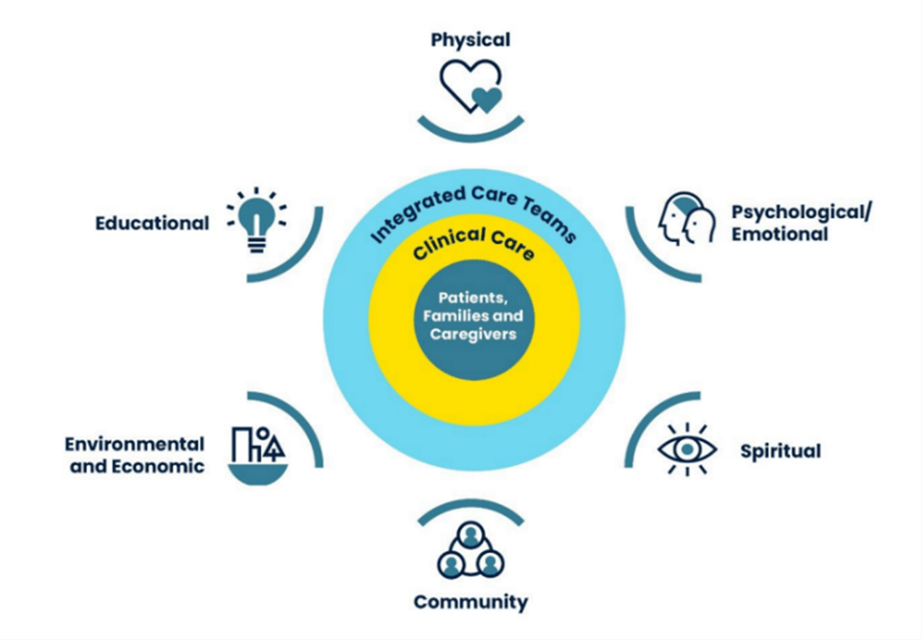Audrey Haberman, CEO, The Sheri and Les Biller Family Foundation
Kamera Museau, Project Manager, Supportive Care Initiative, The Sheri and Les Biller Family Foundation
For many common cancers, the rates of incidence are on the rise. In 2024, first-time new cases of cancer in the United States are expected to reach two million, or almost 5,500 cancer diagnoses a day, with Black, Indigenous, and People of Color (BIPOC) communities experiencing a higher incidence. Within the health care system, there are multiple challenges to equitable care related to gaps in health insurance, access to care and culturally relevant care models, and discrimination and bias in care and treatment.
It is well documented that integrated, whole-person care—what we call supportive cancer care—starting from diagnosis and continuing through treatment improves treatment outcomes, improves the quality of life for people with cancer and their caregivers, and reduces costs.
For more than 15 years, the Sheri and Les Biller Family Foundation has dedicated its efforts to advancing supportive cancer programs across the United States, with a strong emphasis on promoting health equity. One of our notable collaborations has been with City of Hope, where we’ve contributed to the development of an innovative approach to integrated supportive care medicine. Our support has enabled City of Hope to establish one of the pioneering Departments of Supportive Care Medicine in the nation. Most recently, we have made a $10 million donation that will facilitate City of Hope in sharing its practices, research, and expertise beyond its own patient community.
Understanding Comprehensive, Whole-Person Supportive Cancer Care & Its Benefits
Supportive cancer care is a comprehensive, evidence-based approach to care for people affected by serious illnesses, such as cancer. It ensures that people with cancer and their caregivers’ needs are met from the beginning and at every step of their cancer journey in an individually tailored manner, including needs related to clinical, physical, and emotional health, as well as economic and environmental drivers of health.

Supportive care programs can include:
- Relieving symptoms and side effects related to the disease or treatment, such as pain management and nutritional support;
- Supporting the emotional, psychological, and mental health of a person and their caregivers during treatment and survivorship and doing so in a culturally relevant manner;
- Addressing environmental and economic drivers that prevent a person from accessing care, adhering to treatment, and thriving during treatment and survivorship, such as transportation housing and translation services;
- Fostering and strengthening relationships that provide community support, such as community resources and support networks;
- Improving understanding of care options and empowering personalized decisionmaking related to quality of life, such as educational resources and goals of care conversations; and,
- Helping those who wish to better understand how their experience fits within their spiritual and cultural beliefs, such as faith-based support.
Embracing the Role of Cross-Sector Convener
1. Listening and Funding
Our approach has been rooted in listening, challenging our assumptions, and shaping our strategy based on feedback from organizations and communities with expertise and invaluable perspective. We learned that many advances in supportive care have come under the umbrella of palliative care, which is described as layered support for patients and caregivers throughout treatment. However, the term “palliative care” is often associated with hospice and end-of-life care and is misunderstood. Therefore, we use supportive care to explain care provided from the beginning of any cancer diagnosis, regardless of the stage or severity, and inclusive of family and other caregivers as well.
We feel it is vital that BIPOC, rural, aging, LGBTQ, and other communities are heard and centered in our strategy and engagement. As we began to develop our own focus, we first partnered, through funding and learning, with health equity organizations who are leading and working within communities of color and other under-resourced communities.
Over the last year, we met with over 75 leaders from organizations in the cancer care community, including people with cancer, employers, insurers, pharmaceutical companies, cancer care providers, policymakers, and advocacy groups, to hear their insights.
2. Research
We also looked to quantitative and qualitative research, fielding surveys of nearly 10,000 people living with cancer, caregivers, and health care providers. We ensured the survey respondents were reflective of their communities and the disproportionate impacts of cancer on BIPOC communities. We are happy to share this with others.
3. Promising Programs
We paid close attention to successful models of supportive and palliative care, looking to nonprofits, community health centers, and Federally Qualified Health Centers who have been advocating for many years and offering patient navigation through health workers and promotors, digital solutions, multi-lingual education, and much more.
It also became clear that employers are strong advocates and allies because they care about their employees, those living with cancer, and those who are caregivers for their loved ones. Employers are interested in improving their policies by educating their employees, offering support services, and also working with insurers to expand coverage.
4. The Together for Supportive Cancer Care Summit
Finally, we heard from our partners that our foundation might be uniquely positioned as a cross-sector convener that could bring a range of voices, perspectives, and resources to a collective table.
In March 2024, we convened the first-ever Together for Supportive Cancer Care Summit in Washington, DC. The event brought stakeholders from across sectors and the United States to develop a set of strategies to make supportive care the national standard for cancer and other serious illnesses.
Based on feedback from the experts gathered, we focused on five key topics:
- Racism and other structural inequities that impact communities and health care;
- Legislative, policy, and advocacy solutions;
- Enhancing access to patient navigation;
- New standards that can improve access to supportive cancer care; and
- Payment models for success.
The Path Ahead
As we continue our cross-sector engagement, there is important work ahead. We look forward to sharing a consensus paper from the Together for Supportive Cancer Care Summit and continuing to listen to our partners across sectors in the cancer care community to understand how we can best amplify the work that is underway, where we can make the biggest impact, and the best next steps for collective action. We are expecting to increase our advocacy focus and also support more employer engagement.
Above all, we move forward with gratitude for the leaders and experts from organizations across the country who have shared their expertise and perspectives with us about how we can be most impactful. We are so grateful for the work they do every day to help people living with cancer, their families, and their caregivers.
We also welcome the advice, support, and partnership of our peers and colleagues at GIH. Please reach out to either of us at kamera@billerfamilyfoundation.org or audrey@billerfamilyfoundation.org

